Hyperloop Transportation Technologies (HTT) is to partner with private local investors and the Ministry of Transportation in Indonesia in a US2.5 million contract for the exploration of the feasibility for a Hyperloop system for Indonesia. The initial focus will be on Jakarta and a full exploration of Hyperloop transportation connecting Java and Sumatra.
With a population of over 260 million, Indonesia is the fourth most populated country in the world. Jakarta’ population of over 10 million people faces
March 9, 2017
Read time: 2 mins
With a population of over 260 million, Indonesia is the fourth most populated country in the world. Jakarta’ population of over 10 million people faces some of the worst traffic in the world with a commonplace daily four hour commute. An estimated 70 per cent of the air pollution comes from vehicles.
According to HTT, a Hyperloop system would help to help solve these issues; it claims a Hyperloop route from Jakarta to Yogyakarta would take approximately 25 minutes, compared to nearly ten hours by car. A Hyperloop connecting Jakarta Soekarno-Hatta International Airport to the Jakarta city centre would take five minutes, compared to 30 minutes by car.










